#I see the throughlines that led to that point
Explore tagged Tumblr posts
Text
I wonder if being a stage manager has rewritten my brain a lil bit
#I'm in 'over analyze yourself' mode and I wonder#i dont really have the right words to describe it either but it's like... big picture combined with watching shows develop#and seeing how the characters develop from that outside perspective - but having to watch the throughline for cohesion#like me looking at my department changes like oh of course you're (a collective you) like this#I see the throughlines that led to that point#but with me i dont always know how to... change me#I'm just a character with given lines#how do I break the narrative I've been written#how do i become a better person#at least i see the lines i suppose#that's some improvement
6 notes
·
View notes
Note
feel free to ignore if you feel like it's too theoretical/parasocial/etc. but: I see how the campaign as a whole is off because of how lack of prep influenced the cast to create somewhat unfit characters, but as someone who got immensely annoyed by this episode, I'm wondering why has that throughline carried out for so long. why haven't the cast decided to start playing their characters in a way that leads to a more cohesive and satisfying story? is the hesitation and bizzare opinions on gods a very dedicated RP choice or do you think the players themselves are also at a loss? I'm honestly very confused about that, given how driven and decisive they played VM and M9 during their oneshots. I don't want to feel like I'm singling anyone out to hate but e.g. the way taliesin plays caduceus vs ashton is particularly puzzling to me.
Hey anon,
This is all highly speculative (as, to be fair, was the original idea the cast was given very little information, and that turned out to be right) but I think it's the far-reaching consequences of that initial lack of prep combined with the fact that it's been a very central-plot focused campaign that failed to allow the characters to develop into more decisive people. It also, I think, centers the Ruidusborn such that I suspect a lot of the rest of the table is taking their lead.
The Mighty Nein, we know, involved a lot of prep with Matt specifically offering feedback and vetoing certain aspects. Every character came in with pretty clear goals, and because it was a character-driven campaign we got to see those goals change as they learned more: Caleb and Fjord notably abandon their original goals in favor of new ones. Veth and Caduceus achieve theirs; Jester as well, and she develops new ones as she becomes less sheltered. Beau and Yasha's exact goals were much more nebulous, but they have the opportunity to confront their pasts at length and find new purpose and peace throughout the narrative. I don't think it's productive to rehash everything every time but: lack of pre-existing long-term relationships and more work on the short-term friendships that existed, the fact that Beau and usually Molly due to Yasha's absences (and later Caduceus) were free agents who didn't know anyone prior to their meeting, and the fact that the party had like 2 gold to their name and had to double up in odd configurations plus their willingness to engage in conflicts led to a fairly quick and deep bond, which also influenced their goals and dynamics.
Vox Machina were initially very generally sketched out characters, but after they began doing more there was a similar effort put into to backstories, and I think going back after they'd already played a bit meant they knew more about who they wanted these characters to be. The pre-stream plot, as we can tell from the origins comics, was also heavily backstory focused; the Briarwoods arc is when most people feel the streamed campaign really takes off.
We have seen the backstories of the characters of Bells Hells, but a lot of them are deeply tied into a long-running main plot that doesn't really allow for the same development over time. Like, Percy, for example, actually does his "plot" about quarter of the way into the campaign; but this kickstarts his development. Fjord is rather similar; he learns the source of his powers quite early on, but grapples with them until the halfway point and then the rest of the campaign is him embracing something new. To compare, I suspect Laura envisoned Imogen's story as being not dissimilar in the sense of "learn what my powers come from, find a way to better control or perhaps get rid of them" and so upon finding out this is the lynchpin of the entire plot, Imogen never has that post-resolution time to cook, essentially. Even for those who had slightly more rewarding plot beats they kind of felt like "let's address this problem so we can get back to the moon stuff" (Chetney, Laudna) and in some cases, I think it felt to the players, rightly or wrongly, like those plots were actively rushed to the point that they couldn't explore them (I suspect this happened for Ashton during the solstice split). There's been a hurry-up-and-wait sense of urgency over the whole campaign because it's a plot that was introduced very early and has never let up. There's been no "what do we do" type breaks and I'd be shocked if there are. We've sort of run out of plot because we've speed run everything that would have been a plot in a different campaign.
So I think the players don't know how to evolve their characters because there's been no in-world impetus to evolve, really. Now, as someone who prefers to play people who are already decisive, the fact that most of the cast went for kind of indecisive/impulsive types isn't my bag, but that is valid; but it means no one's really had the chance to organically move from that.
I also think that the fact that there's one big plot that really centers the ruidusborn is another factor. Even if Orym, for example, were the type to shut down the party, what is one person who can't reasonably stop two spellcasters from going into the Hallowed Cage going to do? I think this post makes a good point; I think putting the pressure very heavily on two players who (very understandably! for a number of reasons!) are among the most averse to making a hard and potentially alienating or unpopular choice has sort of prevented anyone else from taking a wild swing. The other campaigns had a much more even distribution of who could make decisions within the party, and I think that reflects that. I also think this is uniquely an issue for longform campaigns; I haven't seen this hesitancy from Laura nor Ashley in Candela, Downfall, nor in the various Daggerheart one-shots and miniseries, since you have to swing big there.
I do want to cover one point specifically, which is that I actually find Ashton to be one of the better played characters. I disagree with them, to be sure, but like, Caduceus is a character who can be arrogant in his fairly limited worldview, but who is also consistently very empathetic and kind. Ashton has that arrogance, but without those priorities. Caduceus isn't really invested in hurting those who hurt him; he's interested in stopping those who would hurt his home, family, or friends, and if that requires hurting them he's okay with that. Ashton really does want to beat up those they deem responsible for their own pain, justified or not. I think taking the shard was a great move and stand by that [though, admittedly, it and the bit about Predathos needing a vessel just now have me like. the consequences have been conveyed in a crystal clear manner to ME and somehow the cast is not getting Matt flat-out saying in game THIS IS WHAT WILL HAPPEN, so idk what's up with THAT.] and my issues stem specifically from his decision to claim to speak for the weak and then immediately accept the titans saying that a remade world in which only the strong survive is fine. Like, I don't think there is a problem in how Caduceus is played vs. Ashton, in that I think they are both internally consistent as characters; I think it's just. Caduceus is someone who tries to make decisions that minimize broad harm to that which he deems good, and Ashton is often, by their own admission (episode 78), selfish and conceited. Like, Taliesin is just. Playing someone who is often not a great person this time. And that's a valid choice. But I think it's in a narrative that didn't really permit enough time and space for characters to change meaningfully so Ashton is a bit stuck there whereas, while Caduceus didn't have nearly as much of a gap between who he already was and the hero he needed to be, he had far, far more room to grow.
#cr spoilers#ok i kept this pretty civil fun times in the tags#it's really funny to watch c3 stans attempt to dunk on c2#it's like watching booktok people on goodreads shit on Hamlet bc it's problematic and sad and insufficiently spiceeeee#i mean to each their own but it's very like. actually c2 was pretty beloved in its time. whatever the compulsive liars say#certain aspects were unpopular but like. it was pretty transparent the people hating on late c2 were bitter shippers#whereas. i kept a list of everyone who directly harassed me over shipping in c3. and all of them haven't posted about cr in 6+ months#like in the end it's just not very good and if you think it is it's because you're not very smart.#and we can talk about why it's not good and i think history will be less kind - i think its weaknesses will be enhanced by binge watching#but in the end i think the cast didn't realize that the circumstances to make character development feel natural and effortless#aren't automatic and require a lot of work#answered#anonymous
72 notes
·
View notes
Text
Why I&'m not happy with the Inanimate Insanity finale we got and how I& would fix it
So even before the finale, I& had my& theories on how it was all going to end. To me& it was obvious that there was a thematic throughline in the narrative that was going to lead to a simple yet powerful conclusion.
If you were to analyze the themes present in II, you will consistently find complex characters, ones that hurt others in the past, yet have found ways to change themselves and improve, regardless of whether they're forgiven or not. Balloon, Taco, Knife, Nickel... even MePhone4.
When it started becoming clear that Cobs was going to be a central character in the story, to me& it was obvious that he would go through a similar arc. Let me& explain.
The way I& think it could have gone is, Suitcase and Knife escape from that cell with the help of Bow possessing Apple, but don't run away from the ship entirely. They can't - their job isn't over yet.
One thing about Suitcase is that she values honesty a lot. Cobs wasn’t selfless when he told them the truth about their existence - it is quite obvious it was a tactic to get them on his side - but it was still the truth. And Suitcase can also tell that the story isn't quite complete yet, because there is still a question that hasn't been answered.
So, with the help of Toilet and Bow, Knife and Suitcase hunt Cobs down in the ship and pin him down. That X model that Toilet can control perhaps comes in handy, too. But despite what Knife wants to do, Suitcase stops him and confronts Cobs with words. All she asks is: Why are you doing this?
Of course, Cobs initially tries to pull some bullshit about how he's doing it for the progress, or for money, or even for the sake of the sake of the contestants themselves, but before he can even finish his sentence, Suitcase shuts the excuses down and repeats the question again: No REALLY. Why?
"The Future Is So Yesterday" is playing muffled quietly in the background so that in the brief moment of stunned silence, you hear the lyrics "So Cobs, is your whole persona intended / To keep those suspicions extended / So all your schemes become blended / And your work cannot be contended?", hinting towards how he's cornered in this moment, and to highlight how he's merely playing a persona.
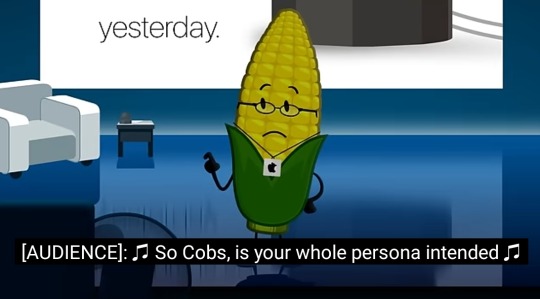
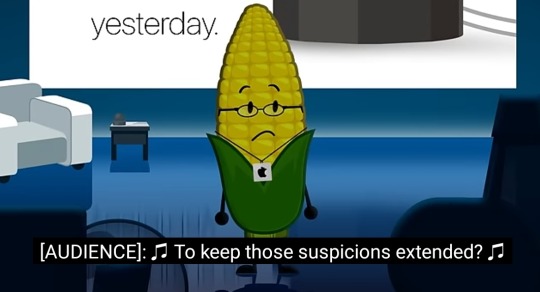
So this is when we get a MePhone4-style flashback moment into Cobs's memories, in a moment when he gets hit with all the realizations and cannot evade the doubts anymore.
So, if you've been paying close attention, you'll notice that Cobs himself doesn't have a very positive relationship with his parents. He says so himself in "Theft and Battery" when he shows off the garage in which he invented his first computer. It is not hard to see how perhaps the pressure from family and a bit of gifted kid syndrome made him think that he has to monetize his hobbies, and eventually led to him tying his company's financial success to his personal self worth.
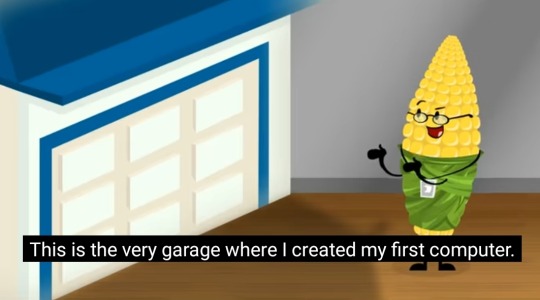
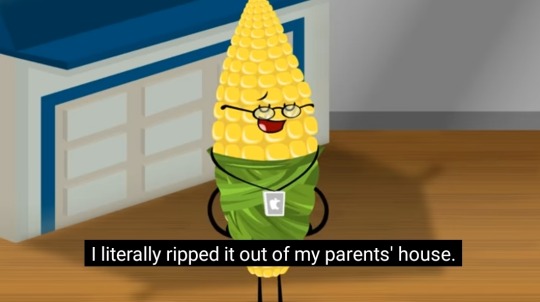
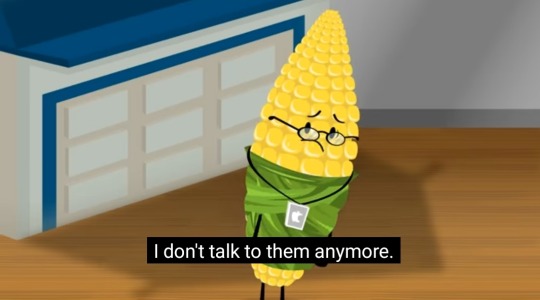
This is important to the analysis - it's not just greed that pushes him to attack the aliens, the stakes are much higher from his perspective because if the company fails, everything he's ever worked on for his whole life is destroyed.
And so, he's pushed by external factors to do horrible things. At first with good intentions (progress and innovation), although at some point it's undeniable that sunk cost fallacy would sink in.
All of this would get visualized through little scenes of his past, depicting this slow descent. But then we would get a scene of another thing he canonically admitted to doing - watching the show, and finding comfort in it.
You see, there's gotta be something that caught his attention and made him this deeply obsessed with the show. And would it really be a stretch to say that, especially with how it's basically confirmed that MePhone4 was basing some of the characters on the things he saw in Cobs, that perhaps he sees those parallels to himself and that changes him?
Remember Marshmallow's grief over how the competition pushes you to be your worst self? To play a persona that isn't really you?
He's not completely ready to change just yet, he has too much to lose, but it undoubtedly saws the seeds for it in his mind. He has other feelings to work through, perhaps the bitterness that he feels at seeing how MePhone4 feels more like a real person than he ever was. He feels inferior, almost like he's failing at his one and only purpose in life. And we know for a fact that Cobs is a complete and total perfectionist - of course these standards he has apply to himself too.
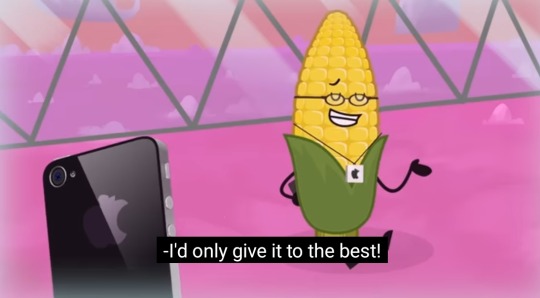
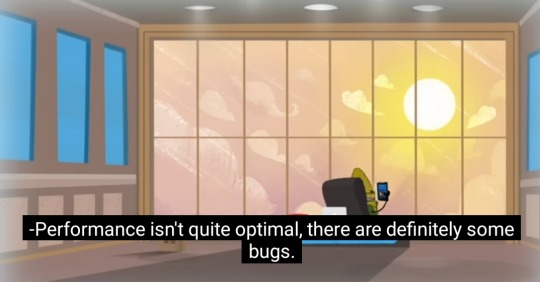
That is why he decides to take the matters in his own hands for the show, and the things that we see and get reminded of in the flashback.
But now, we return back to the present. Cobs is pinned down, disarmed, surrounded by the very contestants that helped his own revelations, and for the first time, someone is actually asking about the real him. He's helpless - Knife has taken the blade in his pocket away, and he can't escape. He cannot dodge the question, and at this point, he realizes that there's not really a way out for him.
Why did he do this? He confesses quietly: "Because it's all I've ever known." And here we have another comparison point - where MePhone4 said this with a pleading desperation, Cobs says it with determination. It's all he's ever known, that's why he did it and that's why it's all he'll ever do. Hurt others like his parents hurt him, and like he hurt himself. To him, that's just a fact of life, and one he prides himself in.
And here is where the main point of this essay and rewrite is - I& want to see Cobs change, get the same character arc as the others have gotten. I& want Suitcase and the others to go and firce him to apologize to MePhone4. He doesn't need to forgive him - in fact, it'd be more fitting if he didn’t - but I& want to see Cobs give his company away to 3GS or MePad, to resign from his past of cruelty, and to have at least someone (perhaps even Suitcase, who has always seen the best in people such as Balloon) support him in this journey.
I& hope you can see from the examples I&'ve provided throughout this essay how this is a much more natural and logical conclusion to this story. I& was extremely disappointed to see that the ending painted Cobs in such a one dimensional light - especially since, unlike the contestants that were intentionally created to be flat and simple, Cobs is supposed to be an actual real person, and it just does not make sense that the theme of self improvement and forgiveness seen so thoroughly throughout the show wouldn't apply to him.
The only thing I&'m not sure how to include in this ending is the Box and MeLife lore. Those parts of the finale were genuinely fascinating and enjoyable, and I& would love to hear other people's suggestions on how we could still have the lore revealed while also giving Cobs a more thoughtful and well rounded ending.
#inanimate insanity#osc#oscblr#object shows#object show community#ii cobs#ii steve cobs#ii 18 spoilers
26 notes
·
View notes
Note
I love how in-depth your mech discussions dive

This isn't even my full power.jpg
I have to hold a lot back, because I don't know how to communicate well without overwhelming an audience.
Let me show you.
I'm right now figuring out how to explain a summary of over two years of investigation into mecha feet and contact-patch design, which led to me designing many MANY foot designs I came up with based on fighter landing gear, tank design, hovercraft, omniwheels, screw vehicles, and my personal favourites: marginal terrain vehicles and the Landmaster of Damnation Ally, which overcomes the shortcomings of 4+ generation Knightmare Frames [...]


(eg, their lack of omnidirectional motion, which they had to solve by transitioning to a psudoquadraped both with the Akito of Exile's 4-leg mode using its arms as walking limbs and the Queen Asura, which is not the same thing as a psudotetrapod because a quadraped has a abdomin structure closer to a jumping spider with the legs arranged inwardly for the front and outwardly for the back, and a tetrapod is radial pushing legs out at square or diamond angles relative to the abdominal centroid)
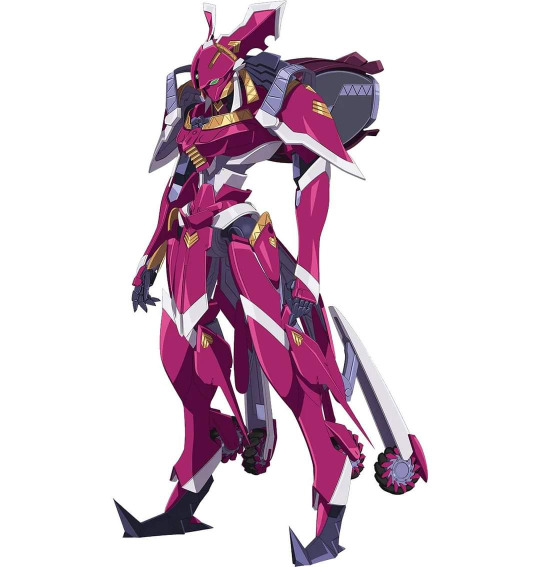
...and of Artos/Armored Trooperoids of Votoms [...]
(which had problems of a small tarus or hoof style foot with zero longitudinal arch which results in a lack of clearly defined calcaneus and thus no formal heel which would allow terrain gripping via the relative motion of the arch and phalangal body of the toes the heel like a beak -- all to encorporate the wheel in the arch-space -- which the design partially compensates through the use of a talon mechanism, and an optional structure fitted to the ankle which folds down to form an extended front foot -- which Armored Core's 5th generation later references in the folding falanges of the UCR series -- and late,r the Blue Knight variant directly addresses by extending the foot by 50% to improve the contact leverage with ground surfaces)


This is accomplished by using the stair-climber mechanism as a heel, but encorporating a scissor mechanism. Right now I'm not happy with where it is and I'm still figuring out where the hinge would go to keep it omnidirectional, which again is the common failure of leg-design in these platforms.



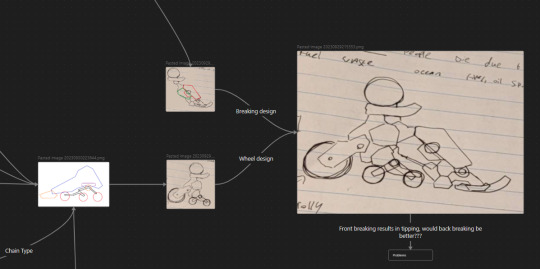
This is a MASSIVE amount of information to take in even in this light summary without diagrams to explain what's happening and I'd need help to really express what I actually want to accomplish.
I'm right now deeply conflicted as to how deep I should actually go because we can get very lost in the weeds and I'm not very skilled at diagramming the points I want to make and I have an entire taxonomic and anatomical language for mecha that I remove from my work when I present it to the public most of the time.
Like do I go into the development path, do I go into the evaluation of evolutionary paths I see like throughlines connecting things like how we got from knightly designs in Panzer World Galient or Dunbine (the first isekai) informs Tekkaman Blade informs Xi Gundam informs Escaflowne informs White Glint informs Unicorn Gundam and Banshee informs NWGIX/V, etc, etc?
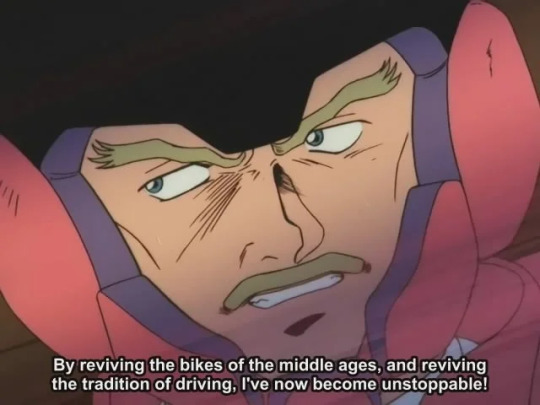
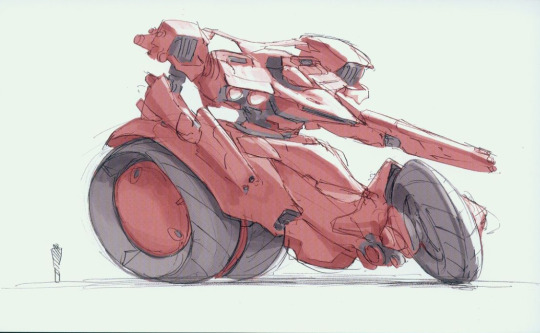
Like there's an entire lineage and family line there being Albidimiles -- albidimiles being a portmanteau of albido (white) and miles (knight) -- not to be confused with the line Samonaut, which are essentially samurai-astronauts commonly belonging to Gundam.
Since we're dealing with design memetics, common concepts of conventional phylogenetic development don't apply since through a genetic lens, mecha is incredibly dependant on horizontal transfer -- eg, passing of information via contact, so adaptions happen not always convergently but frequently in direct parallel, as an arms-race does.




So that's an example of what this is like when I don't filter any of it for an audience, and it very quickly goes off into the weeds.
What I really need to go to the next level is an editor who understands the concepts I'm dealing with; for example, do I talk about the inherent transness of the L-Gaim Mark II and Nagano's own history with gender expression as a mechanical designer and how he expresses those feelings of femininity in his work, or do I go full schizo and present the world with my wild "Nagano-Egg Fashion-Sapphoid-Mantis" theory which is in itself a total fever dream born of conjecture gleaned entirely from his work and photographs of him leering at Tomino instead of his wife at his own marriage?
I need someone to reign me in, but also be able to support me in this capacity -- ie, a research partner who's happy to let me toil in the weeds and then is happy to help me represent these ideas and understand what you as an audience can actually make sense of.
What has happened is I accidently over-studied the design part of mecha and understudied the illustration part which I'm actually very poor at.
I can go so much deeper than I do regularly, but making sure I don't lose people is a challenge I've never managed to solve so I mostly just write for myself and then only turn it into a post if someone has a question.
Sorry if all of this is kinda disorganized.
#mechanical design#mechaphile#mechaphilia#giant robot#code geass#votoms#panzer world galient#armored core for answer#armored core
25 notes
·
View notes
Note
The thing you'd change about season 15?
I thought about this for THREE days. It's such an unfair question! Without grossly altering any PLOT (because that's a rabbit hole we could go down got DAYS), I think mostly this:
Dean's longlasting, complicated feelings about the AU Michael situation and the Ma'lak box must be more overtly spelled out for the audience.
I get what they were going for, that it's a ChALLenGe to the audience to suddenly "hide" Dean's previously-flaunted emotions, but for me, it just didn't land.
///
I think one of the hallmarks of Dean's character is that he feels intensely that things are his fault. From his past behavior, we can infer that he:
(a) feels guilty that Jack took on Michael and lost his soul in order to protect them (b) feels like Jack shouldering "Dean's burden" is what indirectly led to Mary's death
Ergo, in Dean's head, it's Dean's fault everything went to shit. Because Dean wasn't strong enough to keep Michael reined in, it all fell apart. I feel like this is a throughline that previous seasons would have bent over backward to bold and underline.
///
It's there if you choose to look for it. Like here in Moriah:
SAM: He doesn't have a soul. DEAN: And whose fault is that? SAM: Mine. I'm the one who brought him back, and I brought him back because he's family. DEAN (disbelievingly): Okay. SAM: And then he came back, and he burned his soul off to save us -- you and me.
The undercurrent of this whole convo is Dean's inability to keep Michael under control. It's Dean's fault Jack's soul is gone. It flew over Sam's head, sure, but it was still there:
Because Dean didn't get in the box, now Jack has to get in the box.
But it's too subtle, I think. Even as a seasoned audience that "should be able to guess Dean's probable-feelings" by this point, it wasn't enough.
It needed to be in all caps, bolded, and in bright red, not just here in 14x19 but throughout season 15.
///
It's there a little bit, too, in the scripted version of The Trap:
DEAN TO CAS: "I put on you what I couldn't take."
And I feel like this was one of the moments where Dean could have/should have returned to this typical characterization with actual WORDS.
We should have gotten to hear out loud his probable framing of the Jack-soul situation, lamenting his own guilt for not controlling Michael. Dean put all his emotions on Cas because he can't bear to face how he really feels about it.
-OR-
Dean could have shifted the fight with Cas in an another direction, blaming Cas for making Dean wanna stay out of the Mal'ak box. Something like:
Jack and Mary should still be here, Cas! And I should be at the bottom of the ocean.
My thinking for this: In the scene in Ouroboros where AU Michael escapes, we see visually that Dean is squared up to Cas. I have a meta about it somewhere...
In truth, Dean's anger is directed at BOTH Sam and Cas for asking him to stay, but if you look closely and "read" the Cas-diner scene prior more closely, AND if you read Dean's body language, he certainly seems more honed in on Cas here...
I don't think it's a stretch for the lizard part of Dean's brain to blame Cas for being the thing that prevented him from carrying out his ocean-coffin-done plan. We get a whiff of that in how Dean had to avoid Cas to, quote, "not get shaky about his plan."
The Trap even calls back Dean's ocean-box plan by having alternate-future Cas being in the one doomed to the box is just... yeah.
The undercurrents are all there.
///
Anyhoo.
I actually kind of dig Dean getting his "turn" with an existential crisis, and I don't even hate Dean dealing with a flagrantly Michael-coded nihilism. (I mean, it was a Michael-coded nihilism. Dean even echoed Michael's own words about Jack "not being family.")
The pain of all that can stay. I just think it'd pair so much better with the above re: Dean's guilt being spelled out.
That Dean's "failure" to control Michael is what destroyed his family.
8 notes
·
View notes
Text
Elphael: What's In a Name?
Earlier today, my esteemed comrade @the-unkindled-queen made a post wondering about the etymology of Elphael, Brace of the Haligtree. My initial digging turned up a few Reddit comments where the general consensus was that Elphael has its roots (ha) in Hebrew linguistics, with one interpretation being "Family of God" and another being "Work of God":


Now as a linguist and Bible scholar, I think these are awesome. I love seeing all the languages and cultures that these games draw inspiration from, and the Hebrew connection is a neat contrast with the Haligtree itself, which is linguistically Welsh. Additionally, the connection to Abrahamic faith and Hebrew words for people and acts of God is a nice throughline for the way the game portrays Miquella and St Trina as Messianic protectors of the sick and poor. Add in the spiritual atmosphere of Elphael and the Haligtree (prayer rooms, mausoleums, and altar-like statues of Miquella and Malenia abound), and it's a very pleasing little theory.
Soulsborne and especially Elden Ring borrow heavily from Welsh for names and whatnot (like the aforementioned Haligtree), and out of idle curiosity I began to wonder if there was any basis whatsoever for an alternative theory linking Elphael's name to Welsh. My only reasons for going down this path were the vaguely Celtic sound of the name and the fact that the Haligtree proper has a Welsh name. I didn't find anything like this during the search that led me to the Hebrew theories, and plugging various fragmentations of "Elphael" into a Welsh->English translator didn't spit out anything of value. I was about to throw in the towel when I did what I probably should have done before faffing about with the translator and just searched "Elphael Welsh."
And oh golly do we have ourselves an Elphael. Or an Elfael.
Welcome to the infinitely confusing world of medieval Welsh history.
Medieval Wales was divided into several regions, called cantrefi. Each cantref was further divided into several territories called commotes. The cantrefi are pictured below. We're mostly concerned with the central yellow one, Rhwng Gwy a Hafren, but also remember Gwynedd. It's in orange up top.
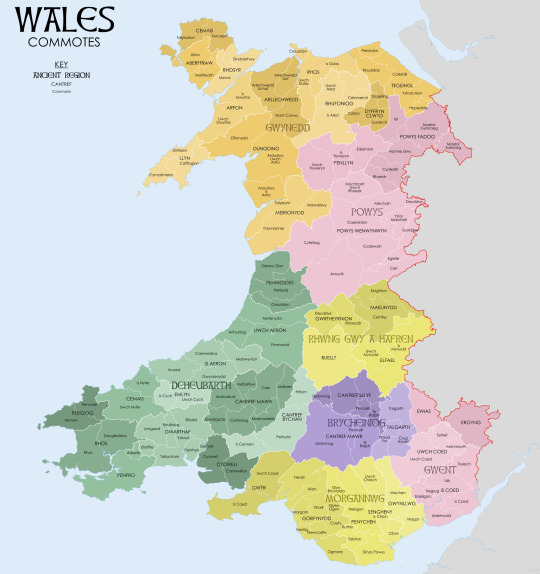
But that's for later. What we care about right now is the cantref of Rhwng Gwy a Hafren, which lies between the rivers Wye and Severn. This cantref is shown in detail below and is home to the commote of Elfael, shown in green. Also take note of Maelienydd and Buellt. They're light blue and yellow respectively, and we're going to need them later.

The history of Elfael is short and confusing, as one can expect from a fiefdom straddling the English-Welsh border during the post-Roman and post-Norman Conquest years. It didn't exist as a political entity for very long (it was only independent from 1155ish to about 1215 before dissolving completely in 1309), and changed hands often during its lifetime.
Our story begins with a man named Elystan Glodrydd, Prince of Buellt. He lived from 950 to 1010 CE, and at some point during his later life he conquered a territory called Ferlix, which was composed of Elfael and Maelienydd. When Elystan died, rulership of Buellt (Ferlix included) passed to his son Cadwgan, and then to Cadwgan's son Idnerth when he died.
Idnerth's reign is remarkable because he's the guy who lost Buellt. An Anglo-Norman noble, Philip De Braose, had conquered basically all the land between the Wye and Severn, which of course included Buellt. For some reason, at the conclusion of his conquest De Braose gave Ferlix back to Idnerth, but kept Buellt for himself. The end result being that Idnerth had gotten kicked out of his grandpa's commote and into what had originally been a conquered vassal territory. Once Idnerth died (presumably in shame), Ferlix went to his son, a man with the astoundingly awesome name of Madog. During this time, the Anarchy was starting.
The Anarchy was a civil war in Britain from 1138 to 1153. King Henry I died in 1135, and his heiress, the Empress Matilda, had many enemies who didn't want her to take the throne. In 1130, a castle had been built in southern Ferlix by one of these enemies, an Anglo-Norman named Pain FitzJohn, Sheriff of Hereford. This is the actual best name in this story. Pain FitzJohn is a fucking badass name. This castle, which was of course called Pain's Castle, was acquired by Madog in 1135 under foggy pretenses. It's likely that Pain wanted Madog's protection from Matilda, but we're not sure.
Old Madog knew that getting a castle called Pain's Castle was an achievement that couldn't be topped, and proceeded to die at age 65 in 1140, secure in the knowledge that he was better than Idnerth. He left five sons, who bucked the trend of going to war for their dead dad's land by dividing Ferlix amongst themselves. Unfortunately for them, this is when the Anarchy caught up with them. Another Norman lord, Hugh De Mortimer, invaded Ferlix in 1142. Two of Madog's sons (Hywel and another Cadwgan) were killed, and in 1146 De Mortimer killed a third son, Maredudd, in the process of capturing Pain's Castle. In 1155, Matilda's son Henry II took the throne of England, and when Hugh De Mortimer protested, Henry kicked him out of Ferlix. This left Madog's two surviving sons, Einion Clud and Cadwallon, to pick up the pieces. These guys hated each other, and neither brother could stomach ruling in consort with the other. But for some reason, they didn't kill each other, instead dividing Ferlix again in two. Cadwallon got the northern part, which came to be called Maelienydd, and Einion Clud got the southern part, which was called Elfael.
Einion Clud and Cadwallon still hated each other, and their realms were openly hostile, each brother still believing he was entitled to sole rule of all that had once been Ferlix. (Again, why didn't they just fight to the death like every other medieval family?) Things came to a head in 1160, when Cadwallon kidnapped Einion Clud and sent him in chains to Owain Gwynedd, the aptly-named King of Gwynedd, who in turn pawned him off on King Henry II. Eventually, Einion Clud either escaped or was released. It's not certain which of these occurred, but what is certain is that by 1165, Einion Clud was once again ruling Elfael, and at the Battle of Corwen the two brothers fought together against King Henry under the leadership of Owain Gwynedd. Politics are fucking weird.
There would be no happy ending, however. Hugh De Mortimer's son Roger was swearing revenge on his father's enemies. You might take this to mean King Henry, who kicked Hugh De Mortimer out of Ferlix in 1155, but no, Roger was actually a big fan of Henry II and had fought for the King during the Revolt of 1173. No, Roger wanted revenge on the guys who ruled Ferlix after his dad got yanked. The timeline here is a bit weird, but what's certain is that Roger De Mortimer killed Cadwallon in 1179. He also killed Einion Clud, but I wasn't able to find out when. I found a source saying that Roger killed Einion Clud after his father died, but Hugh De Mortimer died in 1181 and my reading on Cadwallon says that he was the prince of both Maelienydd and Elfael at the time of his death, which would only be possible if Einion Clud died before 1179. In fact, Cadwallon is said to have been ambushed by Roger's men in Elfael.
Anyway, that's all the history we care about for our purposes. Maybe I'm reading too much into things, but the fact that medieval Wales has the Lord of Elfael getting kidnapped by his brother seems a bit on the nose.
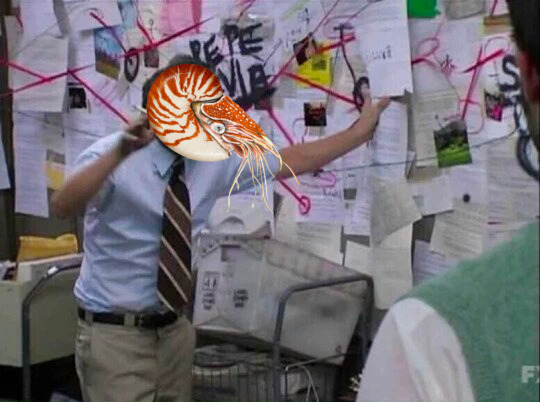
In Welsh history, the Anarchy leaves three of Madog's sons dead and the survivors are on opposing feudal factions. The Lord of Elfael is kidnapped by his brother.
In Elden Ring, the death of Marika's son sparks the Shattering, turning every remaining demigod against each other. The Lord of Elphael is kidnapped by his brother.
Either Miyazaki and Germ are fucking Super Saiyan level Welsh history scholars, or this is just an absurd coincidence. Either way, it's cool.
(tiny sidenote: this part is DEFINITELY conspiracy, but isn't it funny that our kidnapped lord has a sibling who rules Maelienydd??? Doesn't that sound a bit like... Malenia??? Obviously Malenia doesn't do the kidnapping in ER, but the names line up a bit too well...)
Sorry Niko, this is way more than you bargained for.
#elden ring#wales#welsh history#medieval history#elden ring lore#miquella the unalloyed#mohg the omen#malenia blade of miquella#the shattering#queen marika the eternal
65 notes
·
View notes
Note
OH may I ask for your director's commentary on your The Hornblowers' To Command series?? I am so infatuated with it <3
Thank you for the ask! I'm so pleased you like the series. Buckle up, this is gonna run long.
Under the readmore for length and discussions of sexual dynamics:
The Hornblowers' to Command (its official title, I also refer to it as the Any Service 'verse) started with the question "Is there anything that Bush wouldn't do for Hornblower?" a question that I've been poking at for ages. One day while I was pondering that, an anon ask came across @hornblowershitposts, positing that Hornblower might crave being on the receiving end of violent sex, and I thought, "Well? Would Bush hit Hornblower, if Hornblower requested him to?"
(Yes. The answer was an emphatic yes. But it would FUCK BUSH UP, aftercare required.)
Of course the tricky part of that scenario was not getting Bush to hit Hornblower, but getting Hornblower to ask for it. (This is the problem I've always had writing for that pair: Hornblower would rather die than admit to wanting something for himself, c.f. my hanahaki story, "A Well-Rooted Briar" -- but we're not talking about that story right now.) Hornblower was never going to ask to be hit, and that's how this became a threesome story: Maria, who we all know is as devoted to Hornblower as Bush is, could ask for what Hornblower couldn't.
Which then begged the question: how did Maria come to know this was what Hornblower craved? Which led to the backstory (not, I think, mentioned explicitly in that first story) that Hornblower can't get it up without violence. Which had led to some very painful questions on their wedding night, Maria eventually worming the whole thing out of him, one painful, reluctant confession at a time.
btw, all this required that Maria be a woman of MUCH higher fortitude than Hornblower credits her in his narration -- but then, Hornblower is an extremely faulty narrator about some topics. I have long chosen to believe that one of those is Maria.
So I wrote my smutty over-the-top oneshot, and that should have been the end of it -- except that I'd casually embedded in this 'verse the premise that Hornblower had never been able to get it up for Maria.
So whose children are those?
But I didn't get to all that right away: first off there was a whumpy little story in which I gave Bush (and then took away from him) an apotropaic nautical tattoo. I set it in the Any Service 'verse mostly because I needed Maria as a catalyst again: someone to explain the tattoo to, and also a mechanism for drawing some feels out of the normally-stoic Bush.
(See, I'd been reading about maritime swearing/cursing -- since I was a small child, I've been frustrated by maritime novels redacting all the cursing while making a BIG TO-DO about how inventive it is! Apparently maligning someone's mother was BIG FIGHTING WORDS in that era. Because, as the text pointed out, all these men had gone to sea as boys, and their last memory of any gentleness or tenderness in their lives was of their mothers, which caused them to build these women up as nearly goddesses in their emotional worlds. And seeing how I'd made Maria the source of Bush's aftercare in the previous story -- he had desperately needed it, and god knows Hornblower isn't in touch with his feelings enough to provide it! -- I thought to myself, I bet that's how Bush sees Maria's aftercare: as this monumental, nearly holy tenderness that he had hardly known in his life since he went to sea. So that's where I rooted the emotional throughline of "Cock on the Right" -- in those moments of Maria's nearly-holy comfort and tenderness toward him.)
All of which set me up nicely for the next story, which was a story I'd been trying to write for years: Hornblower inviting Bush into his and Maria's bed to supply his own deficiencies. I'd had the beginnings of a story like that in draft nearly since I first started writing this fandom, but I'd never been happy with it. Here, I just threw the original attempt out and started fresh, building upon what I already had in this 'verse: Bush's reverential feelings toward Maria and his deep service-submission tendencies. Nominally "Their Shared Will" (I am so proud of that title!) is a vanilla het story, but in actuality it is all about Bush's submission to the Hornblowers, and thus is as kinky as fuck.
By this point, of course, I had built a 'verse in which all the kids are implicitly Bush's. At which point I mostly stopped being interested in smut stories, and instead became interested in the canon timeline. How did they navigate these different ties? How do canon events and emotions change when the kids are Bush's? How do you navigate a relationship when your shame and repression are so pronounced that you can hardly bear to speak of it?
I have been toying with several more story ideas for this 'verse:
One is smut-adjacent, about what happens when the weird consensual non-consent of "Any Service Required" goes wrong -- i.e., when Maria makes a misstep and does something Hornblower doesn't want. I have a draft beginning for it, but I'm leery of finishing and posting it, mostly because I worry about its reception. But fucking up and violating a boundary in an otherwise loving and care-centered relationship is a thing that can happen, and I do think this trio is cruising for it. I also think "and what do we do about it" is a question worth talking about -- and especially worth exploring with these three, two of whom would rather die than talk anything out.
Another story I have the beginning drafted for is the moment of Hornblower's promotion off the Hotspur. Bush assumes that this is the end of his weird little family, and that without Hornblower to mediate Bush's inclusion, he's going to be cut out. He's wrong.
Three other stories that I want to write for this 'verse, but don't have anything drafted yet:
Bush returning to England in the Temeraire, during the winter of 1806-07, to find a black wreath on the Hornblowers' door.
Bush returning after "Cock on the Right", going to Maria to announce the happy news that he and Hornblower aren't dead after all -- and strangers are living in Maria's lodgings.
Caudebec. Although I'm not exactly sure what to do about this one, because the series is firmly Bush-POV up until this point, and… well. Bush won't be around to have a pov, if you know what I mean. But I would very much like to talk about what it means to go on.
Who knows if I'll ever get to writing them; I have the impression that most of my readership wants a happy ending for the family. I've already received pushback from a couple of different readers on these story ideas.
However! I'm pleased to say that @tgarnsl has a draft of a happier ending for them, where Maria doesn't die and the family runs off to live in Italy together. I hope to see more of that someday. (Maybe I should go ahead and write the tragic stories to give her an incentive!)
Again, thank you for the ask, and I hope you found something here you enjoyed!
#the hornblowers' to command#any service required#hotspur husbands#hornblower fic#dvd commentary#my writing
5 notes
·
View notes
Text
I have listened through season 1 of the Magnus Archives.
If this somehow makes it to the purely Magnus Archives fans, then my discussion may not make full sense.
I'm coming at this podcast through the lens of Zampanio. Zampanio is a thing hard to explain itself, but suffice to say it is a different arg/web series thing and it uses several concepts found in the Magnus Archives, like the different Fears.
There will be spoilers for season 1 and spoilers for this concept Zampanio borrowed, so I may know a bit more than your average first time listener. I read through some of the wiki specifically on this system for the purposes of better understanding Zampanio, but not any of the plot related happenings for the podcast.
So my discussion will be below the cut.
Now, briefly for my Zampanio fellows, sorry I have been away. That I'm still away, really. My Zampanio induced 'hibernation' as I'd been calling it has lasted longer than I expected. I'm not really up to date with the goings-on, though I still get pieces floating by through discord notifications. JR, you asked for use of my pixel art and I never responded. You may.
I am not fully returned to the community. It doesn't feel right if I'm not caught up enough to fulfill my role as Guide. And I am intimidated by the process of trying to catch up with what is an ever expanding series. So my discussions below will be through the lens of things prior to my general departure after Lavinraca.
My discussion continues below.
As I said, I have gone through the first season of the Magnus Archives and I think I understand the Fear Entities system a bit more.
It was neat to see the throughlines of these specific Fears through the different stories of this first season. I could almost tag each story with it's associated Fears (usually multiple as I now see how they oft intertwine). Specifically I am beginning to understand the more nuanced differences between more closely related Fears like Death, Corruption, and Desolation. Season 1 Episode 36 "Taken ill" seems to be trying to make the distinction at least between the fear of death and the fear of the rot.
I did try to keep a close eye on Desolation, a fear I had trouble differentiating between either End or Corruption aside from the association of fire. And that fire association was the only connection I saw between the Desolation and Ria.
I know Ria went on a blaze of arm 1, so that is an obvious comparison. But I couldn't see the nuances of Desolation that led to that conclusion. She always just seemed Eye-coded. The endless pursuit to understand the nature of the world, her wanting to be seen and acknowledged by both Camille and Vic. It all felt it pointed to a desire to know and be known.
I know she made statements of wanting to destroy the world to start anew and those are meant to point to Desolation, but I don't know. It felt a little… tacked on? It never really fit.
I understand the view, the destruction to make room for growth. But I don't really see that in her character. She is a compassionate person, trying to take care of those around her, like Devona when she was stuck in her monstrous form. But the Desolation isn't really integrated with this compassion.
Like, I'd imagine this sort of Desolation would rely more on tough love, of breaking down the bad parts on those they care for to allow them to heal and become better people. But she just seems to focus on just making others better, rather than destroying the parts of them that are hurting them.
I could just be misunderstanding things. I know there is an element of self destruction to her character, maybe an aspect of destroying herself to try to make things better for others. And admittedly it's been a while since I read those related sections.
But I do definitely now better understand the difference between being an Avatar of an Entity and just being haunted by that Entity. I knew that it involved some kind of draw to the Fear, a compulsion to proliferate it. But seeing it through the words of Jane Prentiss in Season 1 Episode 32 "Hive" made it pretty clear.
It's especially useful to compare that episode to something like Season 1 Episode 16 "Arachnophobia". Carlos there was particularly tormented by the fear of spiders, and Jane seemed to be troubled by the wasps in her home as she reached out for help. But she also had a strong compulsion to them, to what they represent, to their actions, to what she 'heard' that others could not hear. Seeing this inner monologue will help me understand the other characters in Zampanio acting as Avatars of their respective entity, like the connection between Camille and End.
Otherwise, I am just generally enjoying my time with the Magnus Archives. I'm going to be continuing on to the next season soon. I was just compelled to write something, probably due to the narrative tone of the podcast getting stuck in my head (though I think it's faded throughout the long period of me writing this).
And, hopefully, I will be able to sit down and reread all the writings in this branch of Zampanio. My memory to particulars has started to fade and my own archival process for Zampanio was actually meant for the purposes of me rereading it. It's just an intimidating amount to read with a difficulty in where to start.
I could just go as a regular explorer would through all the writings in North, East, South, West, NorthNorth, EastEast, and so on. But I wanted to try to find a more coherent reading order to suggest for newcomers before my hibernation. Now I need the order myself, one that I did not make. I'll probably haphazardly tred through my files, maybe trying to write up an order as I bumble my way through. That's why it was been an intimidating task.
But I wanted to make some sort of written thing to check in and say that I am still thinking about Zampanio. Also, sorry for the potentially weird writing voice. After listening to a specific voice for a long time, spoken or written, my inner narration involuntarily mimics it (a Thief of Dreams quality in myself). It's faded in the too long of time of me writing this, and I just noticed this on reread but I don't really feel like rewriting it.
16 notes
·
View notes
Note
5, 13, 19, 20, 57, 74 🩵
hi Eve!!! thank you for asking :D <333
5. Do you like constructive criticism?
i actually DO like concrit but I'm not really sure how to ask for it bc I feel like the general consensus is that it's not really done in fanfic spaces haha;;;
13. what’s a common writing tip that you almost always follow?
I'm not sure if this tip is actually common or not but the one that's definitely helped me the most is to skip around and write stuff out of order :) I used to be really rigid with my writing and try to coherently get from point A to point B because "I can't write what happens here without knowing what led up to it!!" but turns out you actually can and it's MUCH easier to fill in the line between the points if you actually have the points!
19. What is the most-used tag on your ao3?
💀💀💀
Sickfic........ e-e
20. Have you noticed any patterns in your fics? Words/expressions that appear a lot, themes, common settings, etc?
well first of all Sickfic as mentioned about LOLOLOL but also! this is not a proper answer to this question bc it's actually something my friend commented on one of my fics: "Also one of the things that I really like about your fics is the love and care in them always feels very intentional. Like there’s always a feeling of like. I know who you are and that’s why I love you."
and first of all I was like WAAAAAAAAAHHHHH THAT'S SO NICE OF YOU???? but i think it's definitely a throughline in a looooot of my fics and particularly in how I write my most favorite ships. midotaka. imahana. joukai 1000%. i just like it when they See Each Other.
57. Do you prefer editing as you write, or waiting until it’s finished?
I would LOVE to be able to wait until it's finished bc I feel like I'd be able to do more Actual Writing that way but in practice i am always thinking back on my stuff and having it catch my eye and fixing things LOL
74. You’ve posted a fic anonymously. How would someone be able to guess that you’d written it?
I HONESTLY DONT KNOWWWWWWWW. if im being so for real probably that i find a way to bring up A Fever even if it's not a sickfic LOLOLOLOL ee-ee
but like honestly i've written across so many different fandoms and pairings and even just premises (i DO sometimes write stuff that's not sickfic! lol) so i'm not sure if there's anything tying it all together....
though actually now that i've typed all that. i don't have very many longer fics posted (most of it's oneshots!) but i've got a bunch of partially completed long fics for yugioh and they ALLLLLL managed to sneak in a sick scene. so. yeah that's genuinely the answer OTL
thank you again for asking eve!!!! <333
6 notes
·
View notes
Text
The Throughlines
(This column is posted at www.StevenSavage.com, Steve's Tumblr, and Pillowfort. Find out more at my newsletter, and all my social media at my linktr.ee)
Last week I discussed how I took a long walk where I reflected on my life and choices I realized that, as I drifted back over the years, my choices led to more and more “alien” selves the further back I got in time. At some point the you of the past is unknown territory and you can’t learn anything or relate to them.
Now I’d like to discuss an insight from the same exercise that is not about not who I am, but instead very much who I am.
To recap, at one point in my life I took a walk for over an hour, viewing points of “divergence” in my life, asking where choices may have led down different paths. Sometimes I realized that choices would take me so far away that I’d be a complete different person. However throughout this exercise I saw something else, I saw what I call the “Throughlines,” common, consistent parts of my life.
Throughout the many mes there were consistent patterns in my life, weaving not just the life I had now, but most of the possible ones I could see. There was me now, the mes’ I could have been, and behind that were certain, nearly omnipresent elements. I vaguely call them “Throughlines” because they are consistent over time.
I have always been a writer, and rarely go longer than a year or two without some writing project. I never became the fiction writer I once half-heartedly comprehended as a teen, but I am a writer. My past “maybe selves” included technical writing, grant writing, and science writing. Writing is a Throughline, a deeper me.
I’m always an organizer, always having a plan, always having a project. I ran RPG groups and zines, planned software, and more - it’s no wonder I became a Project Manager. Whatever choices I made in my life, I know I’d have been the guy with a scheme. Planning is a Throughline, a deeper me.
I bring people together, it’s the organizer in me. I’m the guy behind the movie night and the writing club, the gaming group. I love to network people so they can come together, and it’s visible in my past from where I was nearly an administrator for an anthropology department, all the way to team building now. Networking is a Throughline, a deeper me.
There’s other Throughlines of course, from my love of theology to the fact I always return to doing art (even when I’m not good at it). You get the idea, somewhere among all the mes I could have been, probably even the ones so strange I couldn’t imagine them, there were these Throughlines. There’s a me under all the me’s.
In fact, I could see times where I could have ignored my Throughlines, tried to be someone I’m not. I can also see how I would have been miserable. For instance, for those who know me, try to imagine me as a humorous corporate IT ladder-climber - had I gone that direction I’d have hit midlife crises two decades early.
As I noted last time, I invite you to try this exercise. Give yourself at least an hour to walk somewhere pleasant and work backwards through your life, asking who you’d have been with different choices. It’s not just a way to ask about different yous, you might just find out more of who you are, even if you’d have been someone different.
There’s a you behind the yous. Go on, get to know them.
Steven Savage
www.StevenSavage.com
www.InformoTron.com
2 notes
·
View notes
Note
im just curious cause i remember when you used to make posts about seeing her and everything seemed happy and light but now seeing that she did yo dirty? tell all please
im gonna answer this one and then that's gonna be the end of that i think.
disclaimer: i am not trying to make anyone look any kind of way. i am actually just telling you what happened.
the tell-all.
there was a recurrent issue in our relationship where we literally just would not hang out enough. which is insane, considering that we were extremely long distance. we would text everyday but it was something like once a week/once every two weeks or more until we would facetime, play a game together, call, or do literally anything. it was rare that things got out of that grey area. it feels like the one thing that actually had time made out for it was sexting, which i still don't know how i feel about.
i often initiated a lot of the hangouts but it got a point where i just stopped extending that hand because i felt like it wasn't being reciprocated after time and time and time of me communicating to her in multiple states of consciousness actually (while i was crying, while i was calm, while i was upset) and time and time and time of her promising me that she'd do better and do this and this and this. i vividly remember sitting in a staircase on the phone with her and telling her how i didn't wanna break up with her because of this, but it was such a big problem, and she sat there and told me all about how she didn't want to break up with me either and how she was so upset that it'd made me feel that way, and then she promised me she'd do better. this kind of interaction would happen at least four times after that. she would maybe do better for like a week or two, and things would fall off again shortly thereafter.
before i continue, i want to make something abundantly clear. i understand that long distance relationships are not easy. they are work, and they require consistency that not a lot of people are used to and can keep up with. however, this girl was a) telling me that she really loved me and shit and that i deserved to be treated this way and this way and this way [huge for me and she knew that, because i do not have a very good relationship history and i was very open with her about that] b) begged me to be in this relationship in the first place, so i figured that she would put a little more effort into it. but really, it felt like once she had me, things never extended past a certain vantage point for all of the 9/10 months that we dated. i felt really frustrated because not only i was sacrificing time while i was doing school and dealing with work, but i also sacrificed a lot to be in this relationship with her. her excuse for not making time for me (despite having a lot of it on her hands compared to me, actually) was that she was "unpracticed," in a relationship in general (...). irregardless of how i feel about that excuse, i feel like i gave her nothing but space and opportunity to practice during our relationship and she hardly ever took it. it really did hurt me knowing that i was putting a lot of work into this relationship and that i was sacrificing a lot against the wits of so many people who were lowkey telling me that i should just break up with her, and half the time she couldn't even make the effort or the time to just like, call me after i've said i wanted her to maybe 7 million times. i gave her a lot of grace. i don't see a reason any longer to continue to give her that grace.
let's talk about new york city.
other than being very sexual, the throughline consistency throughout our entire relationship was her really really really wanting to go to new york city. she had a very romanticized idea of nyc coming from someone who was sheltered in like a british town, and it was a whole thing. this led to us planning a trip to nyc together. i was never particularly overenthused about the idea bc that's like right around the corner from me, but she would say things to me like "when i come see you we wont have this problem anymore" and "things will be different because im gonna come see you [this often] after nyc" etc etc etc. i never fully bought into believing them, but a part of me did at some point and it felt like going to nyc would mark a hopeful transition in our relationship. and nyc was fun. but during that trip, she also realized that all of her romances about nyc were not.. true. and that she actually didn't want to live here anymore (because she wanted to move to nyc, which.. probably wasn't really gonna happen regardless but anyway -- i never fully bought into that either).
i remember that i felt very close to her in nyc to the point where i was laying on her and i started crying to her because i was fearful that things were going to go back to the way that they were and i was very clear about that. for like 15th millionth time, she promised me that it would not be that way and we would do this and we would do that and she would do this and she would do that. school started for me after that trip, and we went genuinely an entire month without calling or facetiming. you can guess the reason why.
i brought it up to her super casually, which transpired into a conversation about her "being lazy in our relationship" -- her words, not mine --, which then transpired into us getting on a facetime call and her white woman tearsing me and telling me about how she loved me but the distance was this and this and this and "how she thought that the distance has taken its toll,"
this is after months of me vocalizing a fear to her that she would just end shit or leave me after going to nyc and me being like "well what if this doesn't work," / "i dont feel like its gonna work [in general]", and her telling me that i was self-sabotaging. this is after months of me expressing all of the discontent that she said to me. and then the conversation turned into us breaking up, which i was really upset about so we "tried to give it another try" (she was overcompensating for like 2 weeks and it didn't feel right, i didn't trust her) and then we officially called it. and i think the last thing that was very insightful for me was during our official breakup, she was interested in remaining friends. personally, i wasn't. but not only did she begin to a) make the same promises that she did to me about hanging out together and playing games together and what not, but she also b) told me that she "wasn't ready for me to go" (meaning that i was like... essentially only allowed to part ways with her when she was ready for it, everything considered) and how she still wanted to keep in contact wit me because i was "fun." she also begged me to not openly talk about things.
i unfollowed her on everything once i got off the phone with her and idk why but the body does tell you a lot and it did feel like a massive release of tension left me the second i was no longer officially single and it was what it was, but that i cut off that point of being cyclically disappointed again and again and again, all over again
in summary: i was very apprehensive going into this relationship and many people can attest to that. i was coming from a very rough place and i did not know how to be a good partner, but i was willing to learn for her, and i think i did a good job everything considered. i did definitely have my moments, and when i say that i don't mean like i'm sedona, i just have issues with emotional vulnerability and she was never really there for me or made a concerted effort to extend a hand other than being like "well lmk how i can help" and i oftentimes couldn't entertain that. but otherwise, i sacrificed a lot to be with her. i sacrificed my time for her, and i told her to not waste my time (she promised she wouldn't, and she did. because it's not like we dated for 3 months, this was almost a year of repeated behavior). i sacrificed $2,000+ for her. i sacrificed so much emotional energy for her. and half the time i really don't think she even sacrificed time for me, and it feels like once she got what she wanted out of me, i was no longer of use to her.
that's it, and except it's not. but that is the gist. there are some other things she did and said but i think this covers a lot of ground.
trust your gut. don't date people you meet on tumblr.
4 notes
·
View notes
Text
Todays rip: 08/05/2024
weird hyperflex but ok
Season 3 Featured on: SiIvaGunner's Highest Quality Rips: Volume L [Side A]
Ripped by Krizis
youtube
Requested by Fezaki! (Request Form)
Y'know, I've mentioned it before, but big medley rips like weird hyperflex but ok can at times feel a bit messy. There's a lot of appeal to that messiness, I talked a lot about that in Man, why does every Bleck actor gotta rap some, but it also gives me a lot less to actually talk about, yknow? A lot of rippers approach things with the simple mentality of making something that purely sounds good, which is fantastic - but I can only say "its fantastic!" to a rip so many times before it becomes uninteresting to read. Not every rip is fit for this kind of coverage, and I was at first apprehensive to cover this one for that very reason - but, like I described with Bramble Blast Collab, these sorts of rips have the ability to tell narratives of sorts through what sources are used in them - meaning within all of the madness. weird hyperflex but ok is comparatively more reserved, but as submitted Fezaki points out, ends up feeling like a big celebration of the whole of Season 3, representing all the big hits and overall throughline to one of the most underrated seasons under the channel's belt.
After an introduction that repeats the infamous opening notes to Megalovania, the rip shows its hand by the chorus - throughout most of its runtime, weird hyperflex but ok is a Grand Dad rip, primarily carried by the tune of The Flintstones from beginning to end. As the channel's most used and over-used joke, its easy to have grown well too tired of the meme at this point, its undergone so many stages of ironic and post-ironic appreciation at this point that its hard to say what the opinion on the meme even is these days - but in my eyes, it was in a great place during Season 3 in particular. Back then, two years after the channel initially started, people were beginning to grow a bit nostalgic for those early days, for that very unique feel that the channel had in its growing pains-days of early Season 1. That feeling was what led to the Nostalgia Critic takeover in the middle of the season, the one discussed in Fragile Snowman (Remastered): After having spent the better part of Season 2 focused on far bigger things than a stupid Flintstones meme, it was really nice to take some time to remember just how much that tune all united us. With Season 3 bringing that nostalgia to the forefront, and like I mentioned in CG Man HD Remastered Edition, the emotions of Season 1 in tow - it makes all the sense in the world for weird hyperflex but ok to headline itself with the funny Flintstone - yet the melodyswap is so natural, it almost feels like a completely original EDM Chiptune arrangement celebrating the channel. Or, well, maybe that's just my unfamiliarity with Hyperflex speaking.
Of course, like I said, its the Season 3 hits that make this rip what it is - its lovely to see Paralyzer be celebrated here so shortly after the Unregistered Hypercam 2 takeover, helping further cement just how much of a legacy the entire King for a Day tournament was going to have way ahead of its sequel being announced. We got Undertale, we got Calamari Inkantation (Off the Hook in KFAD1 reference?), and most importantly - we got SEAN KINGSTON, the legend of Crazy Noisy Beautiful Girls fame himself. It getting an extended 30 second verse all to itself feels special in a way I really can't articulate - as I said back in Take You To The Desert, the Sean Kingston takeover was something purely spurred on by Chaze the Chat's bizarrely high enthusiasm for the guy, and yet all those months after the takeover its STILL being remembered by completely unrelated rippers - that just warms my heart, yknow? It's a lot of the same feelings that Return to Collision Clouds instilled in me, the idea that SiIvaGunner's team members latch onto and care for these small little nuggets of one another's works.
At this point, I do have to fall back to the thing I said at the very beginning of the post and just re-emphasize - weird hyperflex but ok is just plainly fantastic! It is, for a lack of a better word, bumpin', a really celebratory yet fun-loving sound to a rip that is mostly Flintstones - but it EARNS that Flintstones melody through just how befitting its reappearance is to Season 3 in general. Its the kind of rip that exudes genuine love for the channel, and feels like a trip down memory lane on every listen.
#todays siivagunner#season 3#siivagunner#siiva#Krizis#Youtube#hyperflex#chiptune#chiptune music#8bit#8bit music#8 bit music#purely grey#sean kingston
5 notes
·
View notes
Note
I feel like every time there’s an episode that highlights the ways in which Laudna’s character is hollow, we get the opposite moment from Ashton.
Like, Laudna has explicit reason to be pro-god, she was resurrected by one, her rant disregards a large chunk of what’s happened in-game and tries to make a point that fully eludes her.
On the other hand, Ashton’s anti-god/ pro-faith rant makes sense for the character. It’s also wonderful ironic, with the meta-knowledge of the Luxon being a sliver of divinity.
And then there’s the other moment, where Laudna has a conversation with Imogen in which they circle the same topics as always and end undecided about what they want for themselves.
Whereas Ashton has a conversation with FCG that highlights how far both have come as characters and how much their relationship has changed and exactly what each of them is fighting for.
I don’t know. Over and over again, I look at Laudna and Ashton and see two high-concept, aesthetic characters, and one found a way to be rooted in the world, and the other just… didn’t.
How many new NPCs does Ashton’s backstory bring to the game? A dozen? More? And Laudna has… Pate? She just feels so ungrounded and disconnected from the reality of the world.
Yeah...for what it's worth: I don't mind that Laudna doesn't have a pro-god stance. While I do think it's fair to say the gods have in fact done something for her, she spent very little time with Pike and it might not be on her mind. It's just...why would Laudna feel strongly about this at all. Why is she talking. Like, part of what was interesting about her in Hearthdell is that it's easy to see an argument for her fully siding with the villagers (after all, she also had an external force come into town and start fucking things up, was also overthrown by a mostly external group and returned to those who originally led it) but her attitude was "why are we dealing with this stupid bullshit when there's far greater things to worry about." Which was fascinating! And then she was betrayed by a member of the Vanguard! And then she comes back and she's furious and angry and upset...and then it just vanishes and she starts taking the opposite position for no apparent reason, and like, I know this is improv but she kept talking after like 2 or 3 glaringly obvious buttons on the conversation.
It would make perfect sense for Laudna to have the same position as Ashton, is the thing. "People have done harm in the name of the gods (Hearthdell) and I don't know if they've ever listened to me or intervened in my suffering, but Ludinus is doing incalculable harm on a much grander scale right, and we need to be against that, and I am open to the gods making their position more clear to me." Literally that's it.
As for the two...honestly I think the fact that Laudna...isn't high concept is the problem. Like, you can build a character on an aesthetic as a starting point. That's fine! But Ashton is not just punk in looks, but also punk in attitude. Taliesin asked the question "what would punk look like in Exandria" from a philosophical standpoint, worked with Matt to create a chaotic barbarian class, thought pretty extensively through the backstory that led them to the point where we see them at the start, has played a consistent throughline, and so when Ashton takes a stand it feels earned. With Laudna...the things that finally started to build during the Issylra arc (actually expressing unhappiness and anger, being upset with people on both sides of this argument) just vanished, and again, it increasingly seems true that almost all the work done was to support the aesthetic without then going back and weaving it into the story.
I will also add: I don't think having a ton of NPCs is important or a good metric - in fact there was a really good D&D court in which someone had a ton of NPCs in their backstory that their DM had asked them to tone down. I can think of plenty of characters who don't have a ton of NPCs in their backstory, either created by them or by Matt, who are great. Like, actually, part of the issue is again that Laudna is supposed to have this incredibly lonely, empty backstory, and we don't actually feel it. It's been so much tell and very little show.
39 notes
·
View notes
Text
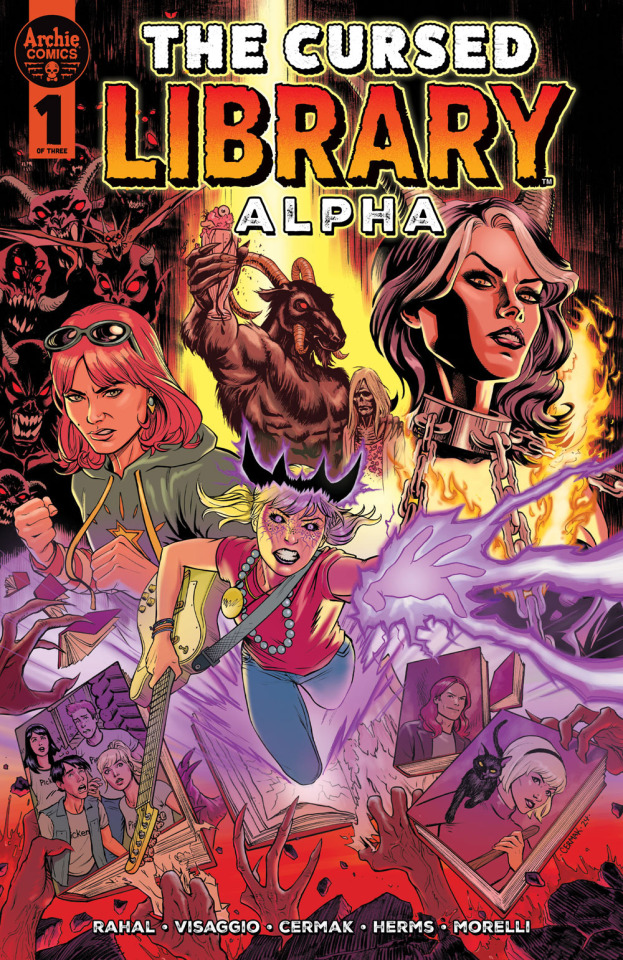
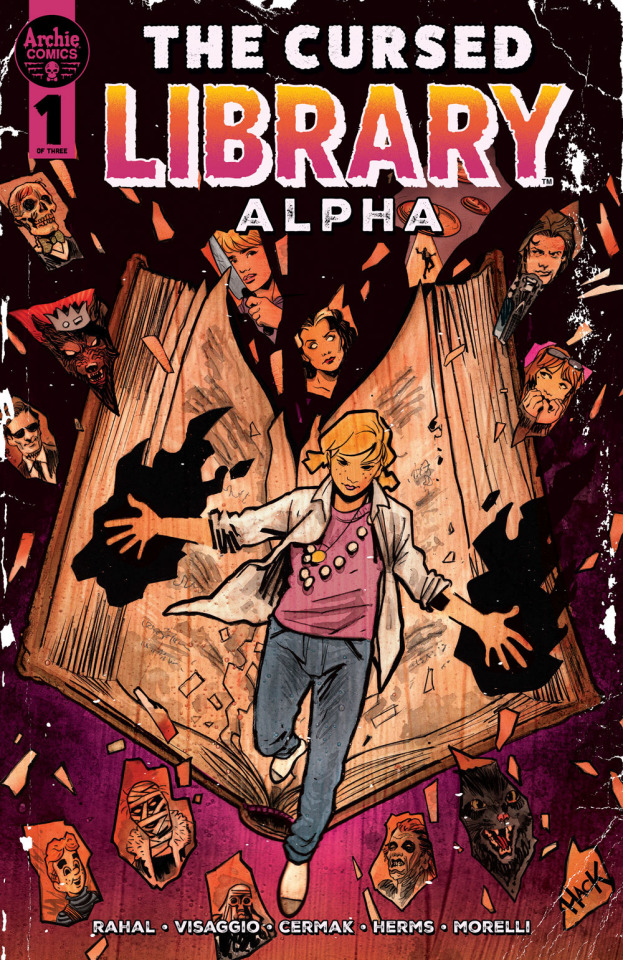
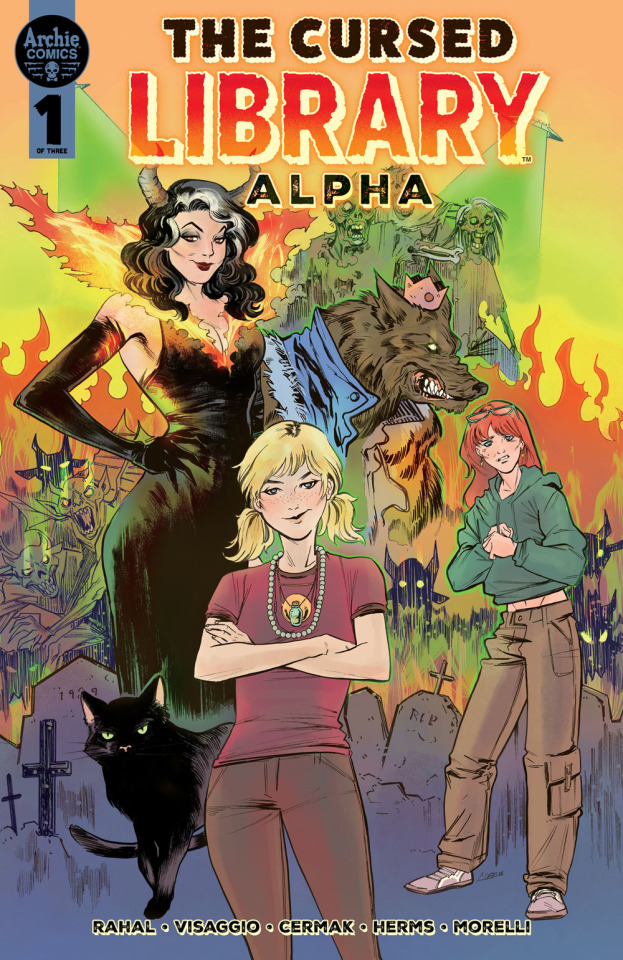
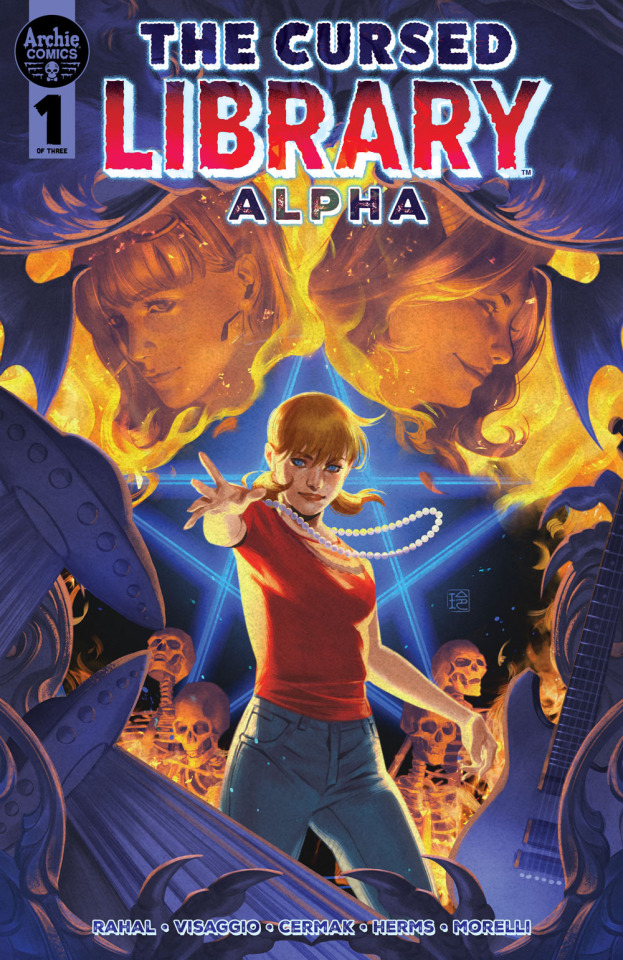

Some big Sabrina horror news today, starting off with Madam Satan featuring in "The Cursed Library: Alpha" miniseries releasing between August to October! (Images and details from ArchieComics.com) Sabrina and Salem feature in sone of the covers!
Dark worlds converge in August when Archie Comics opens the doors to THE CURSED LIBRARY, an all-new premium-printed limited series that unites Archie’s three main horror heroines — and its various one-shot comics — in one explosive storyline by writers Magdalene Visaggio (ETERNITY GIRL) and Eliot Rahal (BLEED THEM DRY) with art by Craig Cermak (RED TEAM).
“The CURSED LIBRARY event that Mags and I have been asked to helm is unlike any other moment in Archie Comics history,” Rahal said. “It’s both a throughline and nexus point that weaves together everything in the Archie Horror universe that’s happened so far. Its goal is to provide shape to the world that has been created. THE CURSED LIBRARY is essentially saying: ‘All of this matters. There is a fabric.’”
Archie Horror readers have been treated to a series of standalone one-shot comics in recent years that can be enjoyed as chilling ghost stories and campfire tales, but eagle-eyed fans will have noticed hints of connection, which came to a head in last fall’s MADAM SATAN: HELL ON EARTH. That story ended with Madam Satan, the escaped Queen of Hell, captured by Jinx Holliday, a teenager interested in magic and rock ‘n’ roll who is rumored to be Satan’s daughter. Jinx is often aided by her loyal best friend Danni, who made global headlines last summer when she was revealed to be Archie’s first transgender character. While all three protagonists have charted their own course thus far, their worlds collide in THE CURSED LIBRARY when each will be tested as Danni descends into the depths of Hell to save her friend’s soul — and the world.
“This is an ambitious project led by two of the best writers we’ve had the pleasure of working with on our horror titles, and, honestly, two of the best writers in comics, period,” said Archie Comics Senior Director of Editorial Jamie L. Rotante. “I have the ultimate trust in them to craft a story that is layered, poignant, and still metal AF. This feels like the culmination of almost everything I’ve personally worked on as an editor, and I’m thrilled that I get to watch Eliot and Mags create a world (or rather, convergence of worlds) that I’m, frankly, in awe of. This is not just a love letter to our fans, but to the art of storytelling as a whole, complemented by the stunning artwork of Craig Cermak.”
Cermak has made a big impact on the Archie Horror line, having illustrated Jinx’s horror adventures and the initial appearances of The Cursed Library itself, a mysterious collection of books that seem to chronicle the events depicted in recent one-shot comics like CAMP PICKENS and BETTY: THE FINAL GIRL. “It’s been exciting to go on this journey with Jinx and see it develop into something much grander,” Cermak said. “Building on top of all the various horror tales featuring so many great Archie characters is providing such a gratifying opportunity as an artist, with so much great material from which to pull.”
Reiko Murakami
Rahal has written all of Madam Satan’s modern adventures, relating the anti-hero’s struggle against Satan and her efforts to chart her own destiny. Madam Satan is one of Archie Comics’ oldest characters, debuting in PEP COMICS #16 in 1941. She was reintroduced as Sabrina’s antagonist in the horror series CHILLING ADVENTURES OF SABRINA, which was adapted as a Netflix streaming series in 2018. Visaggio is the architect of Jinx’s modern resurgence, where she is an older and more macabre version of the classic Archie humor character known as Li’l Jinx, who first appeared in PEP COMICS #62 in 1947. Visaggio scripted Danni’s return alongside Jinx and her solo star turn in last year’s STRANGE SCIENCE one-shot. Danni first appeared in DILTON’S STRANGE SCIENCE in 1989 as an equally brilliant friend and foil to Dilton, Riverdale’s resident genius. The talents of, and more importantly, the bonds between all three women will be the focus of THE CURSED LIBRARY.
“I think what I love and am most proud of is that this connectivity is secondary to the story,” Rahal added. “THE CURSED LIBRARY can stand alone because, at its heart, this is the culmination of two stories: Madam Satan’s and Jinx’s. These two characters have had painful journeys of self-discovery and are finally meeting their climax –– but it’s all wrapped up in the Apocalypse. It’s both the end and a new beginning. And by the time we’ve closed the chapter on the Cursed Library, the Archie Horror line will be diving into a very new and exciting future.”
THE CURSED LIBRARY: ALPHA releases August 21 in comic shops nationwide, with colors by Matt Herms, lettering by Jack Morelli, and open-to-order variant covers by Robert Hack, Soo Lee, and Reiko Murakami. It will be available for pre-order on May 24. The first issue will be followed by OMEGA in September and the final chapter, UNBOUND, in October.
The Cursed Library: Alpha
This is it… this is the moment our horror one-shots have led to… THE CURSED LIBRARY! When we last left off in MADAM SATAN: HELL ON EARTH, Jinx has the former Queen of the Underworld trapped in the mysterious library, as her father-bestowed demon powers have intensified. To stop Jinx from becoming like her father, her best friend Danni Malloy must rescue and convince Madam Satan to guide her through Hell itself to find the one thing that can possibly save her friend’s soul––Jinx’s mom. Along the way, they’ll also discover a number of faces they’ve seen before, though only in the pages of the terrifying tomes within the cursed library. This three-issue limited series horror event tells a story about the bonds that tie us together and how the only thing that can save the world from evil is radical love. It’s Riverdale’s Return of the Jedi meets Dante’s Inferno. A three-part event that will close the door on the Cursed Library and usher in a whole new chapter of horror stories.
Script: Eliot Rahal, Magdalene Visaggio
Art: Craig Cermak
Colors: Matt Herms
Letters: Jack Morelli
Cover: Craig Cermak
Variant Covers: Robert Hack, Soo Lee, Reiko Murakami
On Sale Date: 8/21
32-page, full color comic
$4.99 U.S.
#sabrina the teenage witch#sabrina spellman#salem saberhagen#sabrina comics#archie comics#sabrina archie comics#sabrina horror#madam satan#jinx holliday#danni malloy#the cursed library#the cursed library: alpha#magdalene visaggio#eliot rahal#craig cermak#jughead: the hunger#afterlife with archie
3 notes
·
View notes
Note
can you talk about your thoughts on the Witch Trials podcast? I liked hearing JK’s interview but not much of the rest of it
short version is that it was way too both-sidesy about everything when the two sides did not warrant equal weight
like it kinda posed itself as a primer on “the debate” but it never really covered why the trans movement has a problem with jk rowling. you have contrapoints on saying things like “joanne’s words are very hurtful :c” without detailing what specifically he’s reacting to
and it felt like the producers didn’t really have a grasp of things going into the whole project. they started with a recap of how evangelicals lost their minds over harry potter in the 90s (which for the record i thought was really good reporting) and they had the correct takeaway message of “this group is not really reacting to the books but more leveraging their popularity to push their own agenda and interests”
and i figured they would obviously see the parallels between then and now but they don’t even make the connection, they just act like jk rowling was the center of two media kerfuffles by sheer coincidence
the parts where she actually got to talk were good, but megan phelps roper was kind of a softball interviewer. felt like someone with more journalistic experience would’ve gotten a better interview from her
when megan tried to tie in her own experiences was where the wheels really started to fall off. she doesn’t seem like she’s really grappled with or processed a lot of what happened to her, to the point where i don’t think she even realizes she was part of a cult. her framing of it was “i was raised in a religious family and they taught me hateful beliefs but i don’t agree with them anymore” which like, is ok if you’re a standard middle america christian kid, but you’ve got a bit more to go through if your grandpa is fred fucking phelps. i’m not blaming her for existing or anything, like i know everyone heals at their own rate, but maybe put the podcasting on hold until you get some perspective on cult dynamics
like her takeaway from the experience at this point seems to be “that group taught me to be mean to people, maybe i should be nice to everyone” which led her to give people like natalie wynn a bit more credit than they deserve here. the podcast briefly covers the forstater case and the june 2020 essay, but hardly gets into detail, especially against critics. megan takes everything they say at face value and never makes them explain or defend why they’re saying that jk rowling is a harmful bigot. like beyond whether or not you agree with the claim, it’s just basic journalism to get them to provide evidence
side note but the fact that she pretty much let contrapoints run the show and say whatever he wanted and portray himself as the victim and he still got eaten alive by pride flag pfp twitter users says way more than the podcast ever did
so yeah bottom line it felt like they didn’t really have a throughline for the whole podcast and they were just kinda figuring it out as they went. the recap of the 90s stuff was interesting bc i was like 8 when it all happened so i was kinda only peripherally aware of it and it was nice to have the hindsight perspective, but they just didn’t do anything to connect the dots
7 notes
·
View notes
Text
So I got pointed towards the Pirkei DeRabbi Eliezer, which is a midrashic work (if you don't know what midrash is, it's a type of/collection of a certain kind of Jewish exegesis) that contains a retelling of Jonah and it is. a lot.
Highlights:
Jonah takes place on the 5th day of creation?? somehow?? I know in the Jewish tradition "day" isn't always a literal day but also. bro
Jonah fled because God had punk'd him before and he was worried God was going to make him a clown on an international stage. Literally: "It is assumed by our Midrash that this prophecy is referred to by Jonah (4:2), “Was not this my saying when I was yet in my country… for I knew that thou art a gracious God… and repentest thee of the evil.” So Jonah has quite literally seen this film before and had his reputation as a prophet ruined. Now, keep in mind, the only other time Jonah is named in the Bible is 2 Kings 14:25, but this is saying that Jonah was also the prophet mentioned in 2 Kings 9.... even though the version I've read said that prophet is Elijah. Then again, the beginning says that Elijah's protégé Elisha sends one of their students out to go actually give the prophecy of the coup, so that might be what they mean. I'm looking in the original article for the midrash where Jonah is the boy Elijah resurrects, as this would actually make a good throughline. Still, was a little Shook TM when I read this part.
Really just thinking about the implications of Jonah being raised from the dead by one of God's prophets and then growing up as the student of said prophet, Always Knowing that he wasn't originally meant to live.
The sailors try and dip Jonah a little bit in the water to calm the storm, but realize that the storm starts up again every time they pull him back in, so on the third try they just throw him overboard.
GOD MADE THE GIANT FISH SPECIFICALLY TO EAT JONAH. This makes me crazy. What the fuck.
No seriously read this
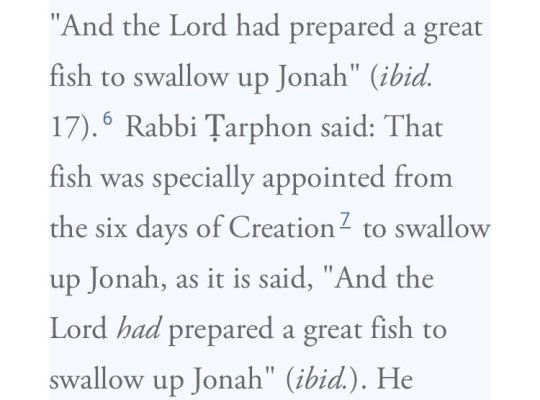
They also say Jonah "entered its mouth just as a man enters the great synagogue, and he stood (therein)." So he just walked in?
The idea of standing is interesting though in the context of Zornberg's article saying that standing=praying: " Elijah’s first words describe his relationship to God: “As the Lord God of Israel lives, before whom I stand ….” (1Kings 17:1) . . . For Cain, to be unable to find a stable place on earth from which to pray to God is, essentially, to be cast out, denied the pivotal spot between death and life: “Anyone who finds me will kill me.” For Jonah, to evade that place is to deny his vulnerability, to prefer death—the foregone conclusion—to the anguish of the human place between … “The heart of standing,” wrote William Empson, “is you cannot fly.” But Jonah, the “dove,” flies, he flees; he is poreach, boreach. Fear leads him to deny his own fear."
Oh also there's a pearl inside the fish that lights up and that Jonah somehow uses to see the ocean. Just so you know.
The fish talks to Jonah and is apparently destined to be eaten by Leviathan, but Jonah tells the fish he has a plan, goes to Leviathan (while still in the fish) and tells Leviathan he's going to beat his ass and cook him for a great feast and flashes his Covenant seal, which freaks Leviathan out enough to get it to fuck right off
The fish then goes Jonah a whole bunch of different wonders, including the Eben Shethiyah, or "Foundation Stone," upon which the world is built
Jonah is basically in Hell now and sees the "sons"/"company" of Korah, who led a rebellion against Moses. They tell him to pray at the Foundation Stone and God will hear him, because they are under the Temple of God
Jonah prays to be brought back to life (again the text specifies standing to pray), but God doesn't answer until he SPECIFCALLY vows to kill the Leviathan on Judgement Day
Which is.... you know.... literally not at all what God told Jonah to do in the first place.
And this retelling ends with Jonah being vomited out of the fish and the sailors of Jonah's ship being SO impressed they all convert and go get circumcized.
Riveting stuff.
2 notes
·
View notes